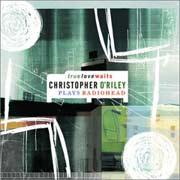Radiohead For Solo Piano
The concert pianist Christopher O’Riley says Radiohead has been “the music in my head,” since he discovered OK Computer back in 1997. Because Radiohead’s music isn’t formally published, O’Riley took it upon himself to create transcriptions so he could play heavily embellished versions of the group’s themes for himself and then as station-break filler for From the Top the public radio show he hosts that spotlights young musicians. He later performed a longer set of Radiohead tunes on NPR’s Performance Todayand the band’s fan base responded positively, which set in motion the process that resulted in this album.
Anything that leads kids into classical music is welcome, though one could argue that Metallica with symphony orchestra, or any rock group with symphony orchestra is both painful and not likely to bring classical music to the attention of young people. Worse, it usually makes for lousy rock music as well.
Radiohead tunes for solo piano works. While O’Riley’s transcriptions for 15 of the group’s tunes add notes between the notes, and are played with greater tonal and textural complexity, they are neither florid nor out of touch with the band’s original intent. O’Riley’s performances add a liquid ease and grace borne of technique to spare, on what are relatively simple but eloquent compositions. Because O’Riley is a fan, he avoids embellishment in favor of exposition. His interpretations bring concentrated clarity to familiar themes, instead of obscuring them with unnecessary and unwanted complexity. His astute use of musical dynamics prevents repetitive themes from sounding…repetitive.
Starting with “Everything in its Right Place,” from Kid A, O’Riley lets you know he’s not playing the “kitsch” card. His take on the repetitive riff in “Everything…” is muscular, yet with a backwater brooding, propulsive current floating small but significant variations on the main theme.
“Knives Out,” from Amnesiac feels like a poignant interlude, with O’Riley’s technique and slower pace adding a level of emotional gravity greater than on the original while remaining true to its intent.
Okay Computer’s “Kharma Police,” with its “This is what you get,” chorus takes on a heightened sense of both helplessness and melancholy. For Radiohead fans not steeped in classical music, hearing the song played solo on an acoustic piano by someone who can liberate the changes from block chording and make the melody take flight and soar should be a revelation—especially since O’Riley has obviously worked hard to not mess with the intent of the original. Add his ability to conjure full orchestral textures from a solo piano, while somehow suggesting the textures of the original arrangements and you have a transcendent work that is far more than a “crossover” gimmick.
Rather than continuing with a “play by play” of the 15 tunes, let’s just say that open-minded Radiohead fans should be delighted by Mr. O’Riley’s explorations while non-Radiohead fans might find this a useful entre into the band’s catalog. For fans familiar with the melodies, O’Riley’s transcriptions manage to add pungency, even as they add a formality not found in the originals. That is a major accomplishment in my book, and a reason why I think this disc will be a hit with fans.
Aiding in the exploration is the superb recording by Grammy Award winning producer/engineer and long-time audiophile Da-Hong Seeto. The piano sound is rich, ultra-dynamic, sonorous and spacious. For Radiohead fans and non-fans alike, True Love Waits should be a musical and sonic treat. Watch for a short interview with Mr. Seetoo on this site soon. For more info on O'Riley and this disc, and sound clips go to: http://www.truelovewaits.cc/



